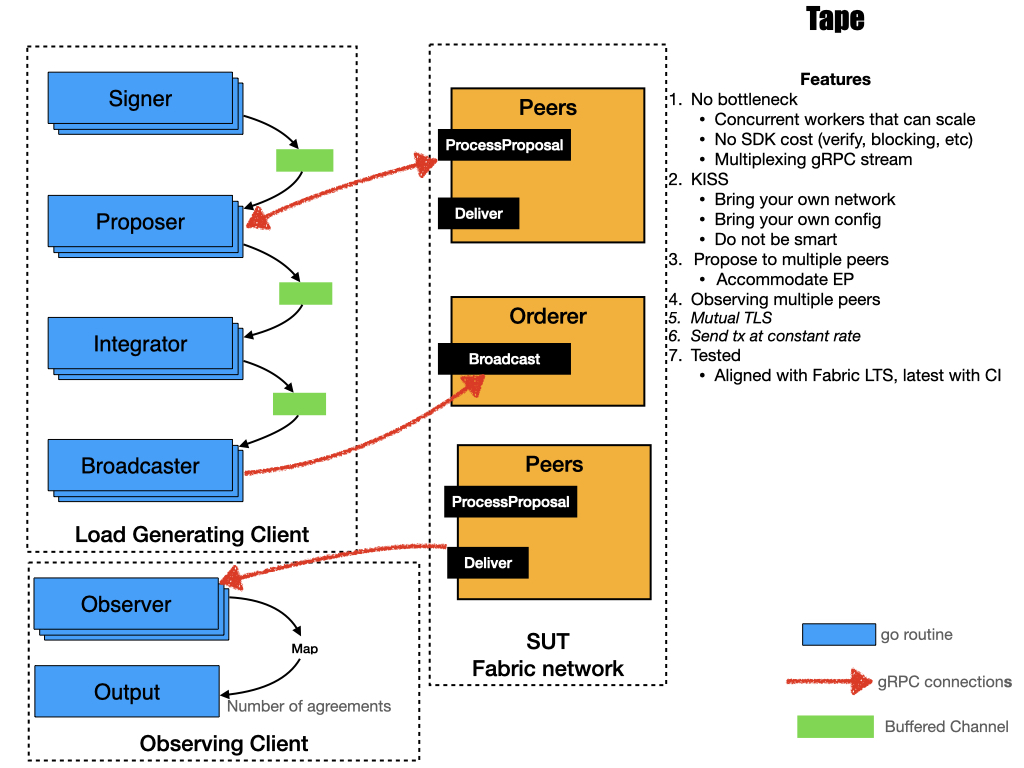A simple traffic generator for Hyperledger Fabric
English/中文
Why Tape
Sometimes we need to test performance of a deployed Fabric network with ease. There are many excellent projects out there, i.e. Hyperledger Caliper. However, we sometimes just need a tiny, handy tool, like tape.
What is it
This is a very simple traffic generator:
- it does not use any SDK
- it does not attempt to deploy Fabric
- it does not rely on connection profile
- it does not discover nodes, chaincodes, or policies
- it does not monitor resource utilization
It is used to perform super simple performance test:
- it directly establishes number of gRPC connections
- it sends signed proposals to peers via number of gRPC clients
- it assembles endorsed responses into envelopes
- it sends envelopes to orderer
- it observes transaction commitment
Our main focus is to make sure that tape will not be the bottleneck of performance test
Usage
Install
You could get tape in three ways:
- Download binary: get release tar from release page, and extract
tapebinary from it - Build from source: clone this repo and run
make tapeat root dir. Go1.14 or higher is required.tapebinary will be available at project root directory. - Pull docker image:
docker pull guoger/tape
Configure
Modify config.yaml according to your network. This is a sample:
endorsers:
- addr: localhost:7051
tls_ca_cert: /path/to/peer1/tls/ca/cert
- addr: localhost:7051
tls_ca_cert: /path/to/peer2/tls/ca/cert
committers:
- addr: localhost:7051
tls_ca_cert: /path/to/peer2/tls/ca/cert
orderer:
addr: localhost:7050
tls_ca_cert: /path/to/orderer/tls/ca/cert
channel: mychannel
chaincode: basic
commitThreshold: 1
args:
- GetAllAssets
mspid: Org1MSP
private_key: ./organizations/peerOrganizations/org1.example.com/users/User1@org1.example.com/msp/keystore/priv_sk
sign_cert: ./organizations/peerOrganizations/org1.example.com/users/User1@org1.example.com/msp/signcerts/User1@org1.example.com-cert.pem
num_of_conn: 10
client_per_conn: 10Click to expand details for configuration
endorsers: include the addr and tls ca cert of peers. Peer address is in IP:Port format. You may need to add peer name, i.e. peer0.org1.example.com,peer0.org2.example.com to your /etc/hosts
committers: observe tx commitment from these peers. If you want to observe over 50% of peers on your network, you should selected and put them here.
commitThreshold: how many committers received the block see as successed.
orderer: include the addr and tls ca cert of orderer. Orderer address is in IP:Port format. It does not support sending traffic to multiple orderers, yet. You may need to add orderer name, i.e. orderer.example.com to your /etc/hosts
This tool sends traffic as a Fabric user, and requires following configs
mspid: MSP ID that the user is associated to
private_key: path to the private key. If you are using BYFN as your base, this can be:
crypto-config/peerOrganizations/org1.example.com/users/User1@org1.example.com/msp/keystore/priv_sk
sign_cert: path to the user certificate. If you are using BYFN as your base, this can be:
crypto-config/peerOrganizations/org1.example.com/users/User1@org1.example.com/msp/signcerts/User1@org1.example.com-cert.pem
channel: channel name
chaincode: chaincode to invoke. There is an example chaincode in chaincodes/sample.go, which simply puts key:value. This is closely related to args parameter.
version: the version of chaincode. This is left to empty by default.
args: arguments to send with invocation, depending on your chaincode implementation. The chaincode used by this sample can be found in chaincodes/sample.go
num_of_conn: number of gRPC connection established between client/peer, client/orderer. If you think client has not put enough pressure on Fabric, increase this.
client_per_conn: number of clients per connection used to send proposals to peer. If you think client has not put enough pressure on Fabric, increase this.
Run
Binary
Execute ./tape -c config.yaml -n 40000 to generate 40000 transactions to Fabric.
Docker
docker run -v $PWD:/tmp guoger/tape tape -c $CONFIG_FILE -n 40000
Set this to integer times of batchsize, so that last block is not cut due to timeout. For example, if you have batch size of 500, set this to 500, 1000, 40000, 100000, etc.
Tips
-
We use logrus for logging, which can be set with env var
export TAPE_LOGLEVEL=debug. Here are possbile values (warn by default)"panic", "fatal", "error", "warn", "warning", "info", "debug", "trace" -
Put this generator closer to Fabric, or even on the same machine. This is to prevent network bandwidth from being the bottleneck.
-
Increase number of messages per block in your channel configuration may help
Help us improve
If you wish for new features or encounter any bug, please feel free to open issue, and we always welcome pull request.
If you are reporting an issue, please generously turn on debug log with export TAPE_LOGLEVEL=debug and paste log in the issue
Development
Click to expand
Tape workflow
Tape consists of several workers that run in goroutines, so that the pipeline is highly concurrent and scalable. Workers are connected via buffered channels, so they can pass products around.
Maintainers
| Name | github-ID | |
|---|---|---|
| Jay Gou | guojiannan1101@gmail.com | guoger |
| Sam Yuan | yy19902439@126.com | SamYuan1990 |
| Stone Cheng | chengyang418@163.com | stone-ch |
